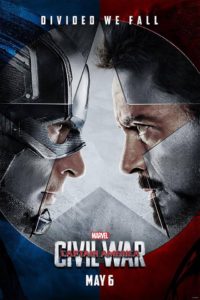Civil War and the Power of Fantasy
Posted by Rampant Coyote on May 10, 2016
 I came out of seeing Captain America: Civil War, and I thought, “Wow. I just saw a really great movie.”
I came out of seeing Captain America: Civil War, and I thought, “Wow. I just saw a really great movie.”
Not “great for a superhero movie,” although there is that. I have some friends that would balk at that, though… just on the basis of it being a fantasy. Obviously, we don’t dare talk about entertainment much, or we’d have a “civil war” of our own. For them, you can’t take a fantasy movie seriously because… fantasy. Ditto for the more far-flung science fiction.
Because made-up people in imaginary situations in impossible settings are totally inferior to made-up people in imaginary situations in settings that seem more realistic to the inexpert reader, or something. That could be something I would less charitably attribute to a lack of imagination, but that’s me being a jerk. Maybe. More charitably, it’s simply that they haven’t been steeped in the fantastic their whole lives as I have been, and find it more difficult to relate. Which is perfectly reasonable… but no excuse to hold it in disdain. Another aspect could be a call back to the pulp traditions of so-called ‘genre fiction,’ which was historically tended to emphasize plot and action over characterization and thematic resonance. Point taken, although modern speculative fiction has broadened considerably with modern tastes, and the style and quality of stories that made up the bulk of the work 70 years ago would have a tough time selling in today’s marketplace.
For me, speculative fiction – even the wild stories of impossible superheroes who can throw cars around (sometimes with only their minds) – can be just as relevant, important, and as emotionally charged as the most serious of literary dramas. Maybe more so. Because speculative fiction has a super-power of its own: The power to isolate ideas from real-world prejudices, politics, and other baggage. It allows the reader to ponder viewpoints at least somewhat divorced from their own place in the real world, without thinking about how it would personally affect them.
While it’s very difficult as an American in these divided times to watch Captain America: Civil War without reflecting on one’s own political ideology, it asks some questions about freedom, responsibility, and accountability to the will of the people through the proxy of the will of the government (which, as is noted in the movie, is frequently not the same thing). Even though the movie emphasizes the title character and his own decision, it presents several viewpoints with at least somewhat equal credibility. There are far more than two sides to the argument, which the dividing line pretty complicated.
But… it’s all about an impossible situation. Heroes using fantastical powers to do what they think is right, saving lots of people… but not all. Their choices have consequences that many are unhappy about (of course). There are tons of real-life parallels, but the fantasy of the movie allows the filmmakers to create a somewhat idealized version of the situation that has no direct bearing on anything today, yet include plenty of real-world trappings to give it verisimilitude. But it allows us to look at the question in isolation and consider the fundamentals of the problem: How much individual liberty and personal responsibility should be surrendered to society for the collective good, and under what circumstances?
Even knowing that this is a metaphor for any number of real-world issues, the fantasy breaks it free from the specifics and exceptions and arguments of the real world instances, and lets the ideas stand on their own. It may be displayed under whatever light the creators choose, but as long as it is portrayed honestly in spite of bias, it’s valid and worthwhile. And, potentially, quite powerful.
Filed Under: Movies - Comments: Read the First Comment
Tesh said,
I’ve long believed the best stories allow us to learn something about our own realities while standing apart from it. The worst stories try to force us to learn something that the writers think is important, no matter what has to be sacrificed to that cause.
There’s a world of difference between the two, and I think that chasm is also part of the “uncivil war” in the Hugos.